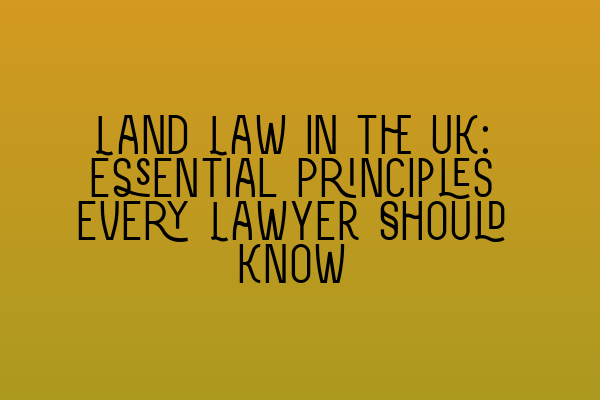Land Law in the UK: Essential Principles Every Lawyer Should Know
Land law forms an integral part of the legal system in the United Kingdom. It governs the rights and responsibilities associated with the ownership, use, and transfer of land. Law students and aspiring solicitors must have a solid understanding of the essential principles of land law to navigate the complexities and provide expert advice to their clients.
In this article, we will explore some of the key principles of land law in the UK that every lawyer should know.
1. Legal Estates and Interests
Understanding the different types of legal estates and interests is crucial in land law. These include:
a) Freehold: This is the highest form of ownership, granting the owner indefinite rights over the land.
b) Leasehold: In leasehold ownership, the owner holds the property for a fixed term, typically granted by the freeholder.
c) Easements: Easements are rights that allow certain individuals to use or access someone else’s land, such as rights of way or rights to install utilities.
d) Restrictive Covenants: These are agreements between landowners that impose restrictions on the use of the land.
Having a clear understanding of these legal estates and interests enables lawyers to advise clients on their rights and obligations relating to the property.
2. Registered and Unregistered Land
In the UK, land can be registered or unregistered. Registered land is governed by the Land Registration Act 2002, while unregistered land is based on common law principles.
Registered land offers certain benefits, such as a guarantee of title and ease of transfer. Solicitors must be familiar with the requirements and procedures for registering land and guide their clients accordingly.
3. Co-ownership
Co-ownership arises when two or more individuals jointly own a property. There are two forms of co-ownership:
a) Joint Tenancy: In a joint tenancy, each co-owner has an equal share, and on the death of one co-owner, their share automatically passes to the surviving co-owners.
b) Tenancy in Common: In a tenancy in common, each co-owner can hold a different share of the property, and on death, their share passes to their chosen beneficiaries.
Solicitors dealing with co-owned property must be well-versed in the rights and obligations of co-owners and provide appropriate advice to their clients.
4. Mortgages and Charges
Mortgages and charges are common forms of security given by borrowers to lenders to secure loans. Solicitors need to understand the intricacies of mortgage transactions, including the creation, registration, and enforcement of mortgages, as well as the implications for both borrowers and lenders.
5. Adverse Possession
Adverse possession allows a person who has been in possession of land without the owner’s consent for a specified period to claim legal ownership. Solicitors must be knowledgeable about the requirements and process of adverse possession and advise their clients accordingly.
6. Landlord and Tenant Law
Landlord and tenant law governs the relationship between landlords and tenants. Solicitors dealing with property transactions and disputes must be familiar with the rights and responsibilities of both parties, including lease agreements, rent payment, repairs, and eviction processes.
7. Land Disputes and Resolution
Land disputes can arise due to various reasons, such as boundary disputes, easement disagreements, or restrictive covenant breaches. Solicitors must be skilled in alternative dispute resolution methods, such as negotiation, mediation, and arbitration, to assist clients in resolving land disputes effectively.
Conclusion
Land law in the UK encompasses a broad range of principles and legal concepts. Having a solid understanding of these essential principles is crucial for aspiring lawyers and solicitors to provide expert advice to their clients and navigate the complexities of property transactions and disputes.
At SQE Property Law & Land Law, we offer comprehensive preparation courses for SQE 1 and SQE 2 to help you ace the exams and succeed in your legal career. To further enhance your preparation, we also provide practice exam questions and mocks for SQE 1. Check out our website for more information on our courses and exam dates.
Related Articles:
– SQE 1 Practice Exam Questions
